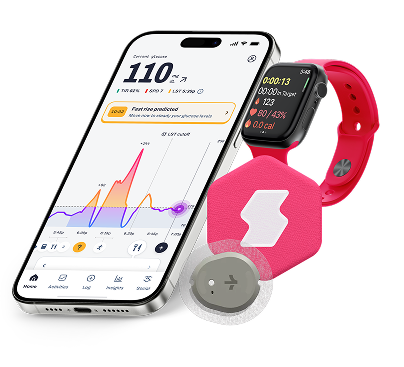Jackfruit, often hailed as a versatile meat alternative and tropical superfood, is garnering attention for its potential impact on blood sugar levels. While jackfruit is naturally sweet and rich in carbohydrates, its glycemic index remains relatively low, making it a favorable option for individuals managing diabetes or seeking to stabilize blood sugar levels.
Jackfruit possesses a moderate glycemic index, typically ranging between 40 to 60, which can contribute to better glycemic control when incorporated into a balanced diet.¹ Additionally, its high fiber content aids in slowing down digestion, further assisting in glucose regulation and promoting satiety. This article will explore the nuances of jackfruit's glycemic impact and its broader health benefits, shedding light on its potential role in diabetes management and overall well-being.
Sign up to be the first to know about special offers and exciting Signos news.
Glycemic Index Table
To calculate the glycemic index (GI) of jackfruit, we need to reference its carbohydrate content and compare it to the GI of glucose. According to USDA data, the carbohydrate content of jackfruit is approximately 23.25g per 100g serving.² To determine the glycemic load (GL) per serving, we multiply the GI by the carbohydrate content and divide by 100. The GI of jackfruit can vary depending on factors such as ripeness and preparation method. Generally, ripe jackfruit tends to have a higher GI compared to unripe jackfruit due to its higher sugar content. Cooking methods like boiling or stewing may also affect the GI by breaking down starches, potentially increasing the GI.
Based on this information, let's calculate:
1. Glycemic Index: The GI of jackfruit can range from approximately 40 to 60.¹
2. Carbohydrate per Serving: 23.25g.
3. GL per Serving: GI (range of 40-60) * Carbohydrate per Serving (23.25g) / 100.

Nutritional Facts
Jackfruit is a tropical fruit renowned for its nutritional richness, offering a spectrum of vitamins, minerals, and dietary fiber. A 100g serving of jackfruit provides approximately 95 calories, 23.25g of carbohydrates, 1.72g of protein, and 0.64g of fat, along with essential micronutrients such as vitamin C, potassium, and magnesium.² Its fiber content contributes to digestive health, while its array of vitamins and minerals supports overall well-being.
The nutritional information below is for 100 g of jackfruit.²
Nutritional Facts

Is Jackfruit Good for Weight Loss?
Jackfruit can be a valuable addition to a weight loss diet due to its low-calorie content and high-fiber content, which can promote feelings of fullness and reduce overall calorie intake. With approximately 95 calories per 100g serving and 1.72g of protein, jackfruit offers a satisfying option for those looking to manage their weight.² Additionally, its natural sweetness can help satisfy cravings for sugary treats, making it a healthier alternative for those seeking to reduce their calorie and sugar intake.
Is Jackfruit Good for People Living with Diabetes?
Jackfruit can be a beneficial addition to the diet of individuals with diabetes due to its relatively low glycemic index (GI) and high fiber content. With a GI ranging from approximately 40 to 60, jackfruit's impact on blood sugar levels is moderate, helping to prevent rapid spikes in glucose levels.¹
Additionally, its fiber content aids in slowing down digestion, promoting better glycemic control and enhancing satiety.² However, portion control is key, as jackfruit does contain natural sugars, and excessive consumption may still affect blood sugar levels.
Better health starts here.
Sign up for tips and insights that work for you!
Allergies
While jackfruit is generally considered safe for consumption, some individuals may experience allergic reactions, particularly those with latex allergies, as jackfruit contains proteins similar to those found in latex. Symptoms of an allergic reaction to jackfruit may include itching, swelling, hives, or even anaphylaxis in severe cases. It's essential for individuals with latex allergies to exercise caution when consuming jackfruit and to consult with a healthcare professional if they experience any adverse reactions.

References
References
- The University of Sydney. (2023, May 1). Glycemic Index – Glycemic Index Research and GI News. https://glycemicindex.com/
- USDA FoodData Central. (2022, October 28). Food Details - jackfruit, raw. https://fdc.nal.usda.gov/fdc-app.html#/food-details/174687/nutrients




.svg)
.svg)
.svg)
.svg)
.svg)
.svg)
.svg)
.svg)
